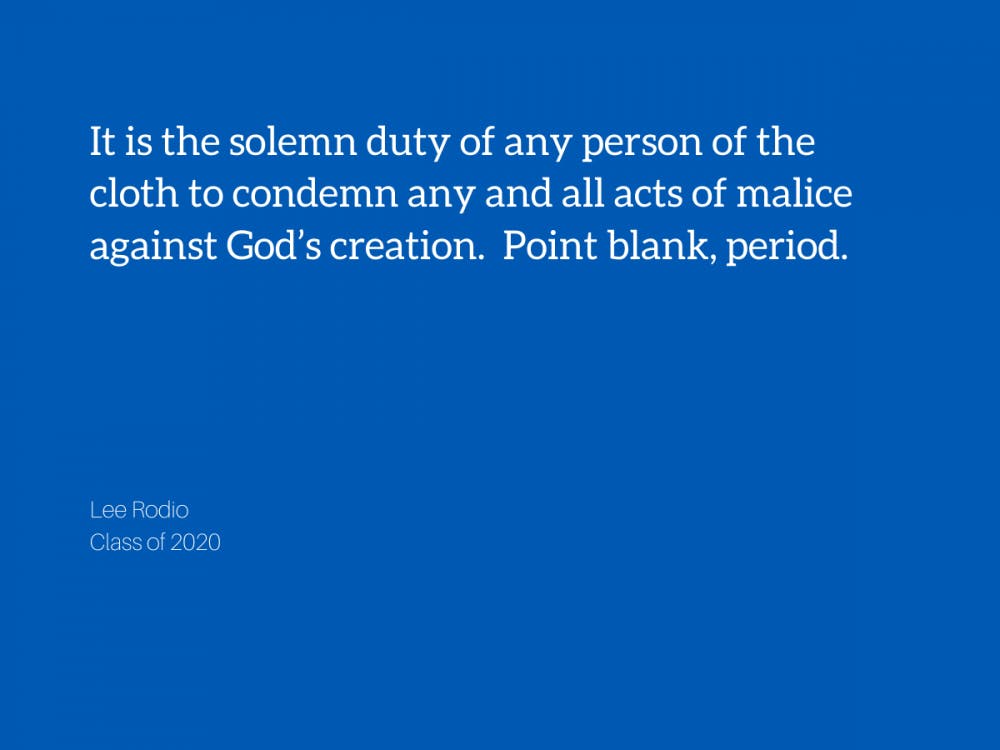I usually try to stay away from the Chronicle’s editorial section, as I get more than my fair share of heated debate via Facebook. However, as I thought about those who had been jilted or pushed away from the Church by a similar kind of wrong-headed, prideful, infallible mentality, I decided that I could not let what was said in Reiss Becker’s critique of Sophie Laettner’s article be the last word on the issue.
If the Church is not calling out White Supremacy at every possible opportunity, then the Church has failed to be the Church. Jesus himself told us to love our neighbors as ourselves—that’s our entire job description as Christians when it comes to interpersonal relationships. Any pastor who is somehow unable to equate white supremacist violence with doing harm to one’s neighbor might want to go back to divinity school, and perhaps kindergarden while they’re at it. It is the solemn duty of any person of the cloth to condemn any and all acts of malice against God’s creation. Point blank, period.
As for white supremacy and the Christian Church in the West, this may come as a shock, but we are so afflicted with white supremacy, we can’t even seem to come to terms with the fact that the guy that we worship—the Middle Eastern-born Jew—probably didn’t have fair skin, dirty blonde to brown hair, and blue eyes. In the mid-20th century, Dr. King said “the most segregated hour in America is 11:00 a.m. to noon on Sunday morning.” Here we are a quarter of the way through the 21st, not doing too well on that front either, are we? Not to mention the fact that all but the very first iteration of the Ku Klux Klan has been founded and heavily marketed as an exclusively Christian organization.
I agree with Reiss when he states that many of the strongest Christian traditions in our country today are found in our black and brown communities. In spite of, and often in response to white supremacy in the Church, these houses of worship have become places where the love and Prevenient Grace of Jesus Christ has fostered generations of care, nurturing, community, belonging and prosperity in the face of endless adversity. These communities have flourished in spite of the fact that in many cases, the ideology on which they were initially founded was the twisted and mangled version of scripture promulgated by the slave masters of early America. What could be more perverse and wrong than to knowingly misrepresent the words of our Lord for the explicit purpose of prolonging the subjugation of a whole class of people, simply based on your own backwards beliefs that your skin color affords you more of a claim to freedom and equality in life?
Nevertheless, in spite of the wolves of white supremacy barking at the door, communities like Emanuel AME Church (the entire AME and AMEZ denominations existing in the first place because white methodists insisted on segregating sanctuaries) became such bastions of the mighty love of Jesus that when a white supremacist terrorist entered their place of Christian worship, gunned down their leaders and cursed their culture, Mother Emanuel vehemently rejected her every right to rise up in anger, and instead showed us all that indeed, when through many dangers, toils and snares we have already come, it is the Amazing Grace of Jesus that will lead us home. When God is with us, even bullets can’t tear us down.
The author’s fixation on the technicalities of Ms. Laettner’s letter betray a deeper insecurity regarding the real claims made therein. Why do we need a comprehensive chart of the modern-day denominational delineations of the Church? She said the “Christian Church,” and I take that to mean any church that claims to follow the teachings of Jesus, the Son of God. Denominations may vary.
Most importantly, she didn’t seek to disparage our faith in the least; instead, she sought out the help of the most collectively foundational organization in the history of mankind in addressing a growing problem in our country. Just because a shooter doesn’t mention any Christian buzzwords in their manifesto, doesn’t mean we as Christians didn’t have some small part in driving them to that point, and it suren’t doesn’t excuse us from our duty in working to prevent the next such attack.
To Sophie, I appreciate your letter, and I personally commit to doing all in my power as a Christian and a United Methodist to defeat White Supremacy. To anybody reading this who isn’t too sure about the Church or the Christians in it, I understand, but know that we are doing our best to be better. The Church at its worst is hostile to self-reflection, and the Church at its best is constantly changing in the name of Jesus to meet the unique needs of the world.
We’re greatly flawed, but we’re not defeated, not even close. Fixing this world is going to take everyone: Jews, Muslims, Hindus, Buddhists, Sikhs, Agnostics, Atheists, and a Christian Church committed to being the best version of itself that it can be, whatever that takes. When you look at it that way, those same problems don’t look quite as insurmountable after all.
Lee Rodio is a Trinity senior, an Elected Lay Member of the North Carolina Conference Delegation to the Southeastern Jurisdictional Conference of the United Methodist Church and the Corridor District Lay Delegate At-Large for the North Carolina Annual Conference of the United Methodist Church.
Get The Chronicle straight to your inbox
Signup for our weekly newsletter. Cancel at any time.

